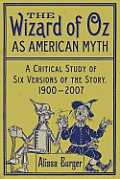Critical Study of an American Myth
On his Tales from the Bookworm’s Lair blog, J. Andrew Byers just reviewed The Wizard of Oz as American Myth: A Critical Study of Six Versions of the Story, 1900-2007, by Alissa Burger, just published by McFarland.
Burger examined six versions of the story originally created by L. Frank Baum. In chronological order, they are:
Burger’s book appears to hit on a lot of the current concerns of academia: gender, race, and adaptation and influence, as well as Baum’s overt themes of the value of “home” and the role of magic. Not that there’s anything wrong with those concerns, but in other times I might expect an academic critique to address economic classes, nature versus civilization, or stylistic tropes.
Byers writes:
Burger examined six versions of the story originally created by L. Frank Baum. In chronological order, they are:
- The ur-text, The Wonderful Wizard of Oz.
- The 1939 MGM movie.
- The Wiz, the story’s second successful run on Broadway.
- Gregory Maguire’s novel Wicked.
- The Broadway musical adapted from that novel.
- SyFy’s miniseries The Tin Man.
Burger’s book appears to hit on a lot of the current concerns of academia: gender, race, and adaptation and influence, as well as Baum’s overt themes of the value of “home” and the role of magic. Not that there’s anything wrong with those concerns, but in other times I might expect an academic critique to address economic classes, nature versus civilization, or stylistic tropes.
Byers writes:
Burger says she wants to examine gender in Oz. Fine and dandy. But as a historian of masculinity (among other things), I am particularly sensitive to “gender” being merely a code phrase for “women” or “femininity.” What we’re lacking here in Burger’s analysis is a look at masculinity in Oz. Men do, after all, possess gender, just as women do.Byers notes that Burger doesn’t discuss Baum’s sequels, and his parenthetical remark reminds us that he knows those books show the Wizard learning real magic. He remains subordinate to Glinda, his tutor, and Ozma, his ruler, but also appears to be more ingenious than either. Because he’s older? Because he’s male? Because he had to get by for years without magic? Because he’s American? Or perhaps just because of the characters’ individual personalities? More grist for the analytical mill.
This is a significant omission, since all of the male characters in the story suffer from significant “lacks” (brains, heart, courage, magic) that the women in the story possess in abundance. None of them is what we might think of as a “traditional” male figure, in Baum’s time or our own. In other words, this is a clear area for further study and represents a missed opportunity in this one.
There are also a few additional areas I’d have liked to see Burger tackle. For example, in her discussion of magic, there’s almost no mention of the pivotal character of the Wizard in any of the texts/productions. He’s a self-proclaimed “humbug” without any access to real magic (at least in the first book), but everyone thinks he’s intensely magical. When coupled with the fact that he’s also the only male magical practitioner we encounter in Oz, I think there’s room for an interesting discussion here.



No comments:
Post a Comment